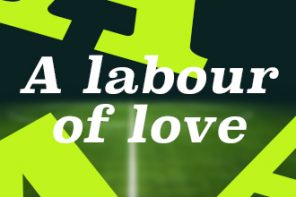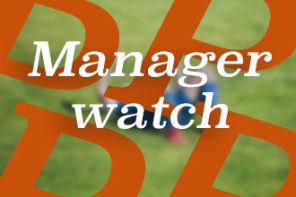Midway through the third season of Breaking Bad, a stuporous Walter White thinks back to his ‘perfect moment.’ White, still in remission from cancer, has lost everything and looks back to a moment months previously, when he was sitting back on his sofa while his ex-wife sang to their recently-born baby, that would have been the most fitting last memory: the image with which to bow out; the apex of life’s curve.
March 18, 1981. Perhaps that was the perfect moment for Ipswich Town fans of a certain vintage. That night a wonderful Saint-Etienne side, containing Michel Platini and Johnny Rep, had been swept aside in audacious, swaggering fashion by an unthinkable aggregate score of 7-2 in the quarter-finals of the UEFA Cup. It was, even by the short-term measures applied today, one of the most remarkable victories mustered by any English team in Europe. A week previously, Nottingham Forest had been defeated at the same stage of the FA Cup to confirm a semi-final meeting with Manchester City. In Division One, a trip to Old Trafford lay in wait and Bobby Robson’s side were a point ahead of Aston Villa at the top. They had led the table for long periods of the season and lost just two of their first 32 league games.
“An extraordinary mélange of Dutch, English and Scottish talents,” was how the Guardian’s Robert Armstrong described Ipswich after Forest, themselves a supreme power in the early 1980s, had been disposed of comfortably in a league game. “At a time when the game is beset with neurotic self-doubt, a visit to Ipswich suggests there is little wrong that healthy ambition and individual quality cannot cure.”
Ipswich were playing some spectacular football and much of it was owed to their midfield, a diamond with John Wark at its base, Eric Gates at its tip and the Dutchmen, Arnold Muhren and Frans Thijssen, at either side. The quarter interchanged bewilderingly, to the extent that Wark would score a jaw-dropping 36 times in all competitions.
“People can’t work this out sometimes,” laughs Wark. “I was the most defensive of the four but scored all those goals. We had a system with Arnold down the left, Frans on the right and Eric, who never used to come back and defend, off the front two. I was doing the work in front of the back four and getting the goals as well. It was all down to making late runs, which I think is a bit of a dying art. When I went in the box my team-mates always knew I was coming in, and would make space for me. We all knew exactly where each other would be.”
The Ipswich whirlwind would score 77 league goals over the course of the season and a further 47 in the cups. Among the 47 were those that would win the UEFA Cup – then taken with the utmost seriousness – 5-4 on aggregate against AZ Alkmaar, and confirm Ipswich’s place as one of Europe’s elite. Robson, who had been courted by Barcelona after establishing Ipswich as a top-six side for most of the previous decade, had built something extraordinary and his creation seemed capable of anything – including the club’s first league title since 1962.
But Ipswich lost that game at Old Trafford and would take only six points – three wins, in old money – from their final 10 games. That included a win at Villa to take them temporarily back to the summit, but Ron Saunders’ team hit form at exactly the right time to win the league by four points. Even now, the pain does not quite disappear.
“It’s the only regret of my career,” says Wark. “I won the league later with Liverpool but I should have done it at Ipswich. We were the best team that season.
“You can look at the stats to pinpoint why we didn’t win it. We only had about 16 players but played 66 games. We beat Villa twice in the league and again in the cup. They had a small squad as well but had nothing like our schedule. You play with injuries, need injections to get through games, and it just gradually stacks up. In the end, it just told and we couldn’t do it.”
Villa only played four cup games that season, 20 fewer than Ipswich. They won the league fair and square, without the need for distractions or long, midweek European journeys at a time when such logistics did not come off with the military precision in evidence today.
As Ipswich’s bumps and bruises – and more serious issues, such as the January injury that ruled outstanding right-back George Burley out for the season’s final months – racked up, the squad’s thinness became more obvious.
“Russell Osman played all 66 matches,” remembers Wark. “I was second with 65. I think it did take its toll. In those days you were taking whacks and kicks, and I think the Easter period was critical. We were playing Saturday, Monday, then Wednesday in Europe and just couldn’t quite do it.”
Those few days over Easter were brutal for Ipswich. A home win over Arsenal on Easter Saturday, four days after that victory at Villa Park, would probably have seen them grit their teeth and stumble over the line. But, on an afternoon that began with the curious sight of goalkeeper Paul Cooper being presented with the club’s player of the year award by his opposite number, Pat Jennings, reality bit. The influential Thijssen missed the match with a groin strain; the centre-back, Kevin Beattie, had broken his arm a week previously as Manchester City pipped Ipswich to a place at Wembley. In the first half, Gates pulled up lame and was withdrawn, Peter Nicholas scoring for Arsenal moments later. It counted, despite originally being flagged for an Alan Sunderland offside. Kenny Sansom headed in a second at the far post and Ipswich, well beaten, were on the ropes.
Local rivals Norwich then beat a depleted team 1-0 at Carrow Road on Easter Monday and it seems miraculous that, just another two days after that, Terry Butcher’s winner in Cologne took Ipswich to the UEFA Cup final. Their focus had been extraordinary, their pedigree unquestionable, but league-wise the writing was on the wall even if interest remained alive until a defeat at Middlesbrough on the penultimate weekend.
“If we’d had just two or three more players I honestly think we would have won the treble that year and been one of the greatest,” says Wark. “We knew we were onto something special. The Dutch guys had come in a couple of years previously and we had younger players like Osman, Butcher and Alan Brazil coming through. We all thought – and I still think – that our 11 players could match anything. People talk about the best Liverpool teams of the time, but we were as good as them. We just ran out of games in the league.”
It was important to win something, and perhaps the most impressive thing about Wark and his Ipswich team-mates’ season was their recovery from such a huge disappointment. “We were absolutely gutted and there’s no other way to put it,” he said years later. But four days after losing at Ayresome Park, Ipswich thumped AZ 3-0 at Portman Road in the first leg of that UEFA Cup final. This was an advantage that they would not relinquish, and watching Mick Mills lift the trophy it still seems possible, even now, to believe that bigger and better things remained on the horizon.
It was still plausible a year later, when Ipswich – who had started more slowly this time – narrowly failed to catch Liverpool in a late dash for the title. But there was to be no title, no crowning moment for Robson and a team that had achieved international renown. Instead, there was the feeling that perhaps, if time had frozen in March 1981, the possibilities would have been limitless.
What happened next
Robson was lured by England in the summer of 1982 and Ipswich, who had overreached in building an expensive new stand after the 1980/81 campaign, began to fall apart. Muhren, Thijssen, Mills, Brazil, Mariner and Wark all departed. By 1984 Ipswich were more than £1m in debt and losing £10,000 a week – huge sums at that time – and desperate to recoup the £2m capital cost of a stand that, as Armstrong would write in an elegiac Guardian piece, “seemed a sound investment amid the euphoria of the late 70s but football has undergone an economic revolution since that confident era”. Ipswich, he wrote, were “undeserving victims of their own success”.
Wark, reluctantly but pragmatically, moved on to Liverpool. “As soon as Bobby left that was it,” he says. “The team had to sell players and I thought we were never going to be a force again, which was why I left in the end. If Bobby was still there, I’d probably have never left, but five or six of the team had gone and I couldn’t see us winning things anymore. I wanted to improve my career and the club needed the money, so it worked out for everybody.”
You can follow Nick Ames on Twitter (@NickAmes82)
Enjoyed that? Why not have a read of Nick Miller on Watford 1982/83






